On Thursday, April 4, 2005, over one hundred people participated in a commemoration ceremony to mark the 57th anniversary of the massacre at Deir Yassin. The ceremony took place in the area of the village, at the entrance to the mental hospital that is located on the remains of Deir Yassin. The event was organized by Zochrot together with the organization Deir Yassin Remembered, and was conducted by Ranin Geries of Zochrot.
The ceremony began with a moment of silence to remember the victims. Ms. Heria Abu Shusha, a member of the Deir Yassin Commemoration Committee, spoke of the massacre at Deir Yassin. Between 115 and 140 victims were killed, of whom 93 names are known. The massacre was a turning point in the history of the Palestinian people, since the terrible news about the brutal acts of the Jewish occupiers caused widespread shock and departure by the Palestinian population. "At Deir Yassin the ethnic cleansing of the land began," she said. She also emphasized the importance of a respectful commemoration, and raised the hope that the state of Israel would be willing to allow the descendants of the refugees to enclose the cemetery of the village by a fence and turn it into a memorial site.
A member of Zochrot read a statement by the organization:
"Deir Yassin was a turning point in the sad history of this land....
Our path, Jews and Arabs, is not the path to shallow co-existence between those who love peace, although we do strive for peace. Our path does not seek to turn a new page between Jews and Arabs by forgetting the past and turning blankly to the future, although we do struggle for a better future for all of us. Our path is to remember and to look into the past.
In 1948, Jews, who made up a minority of the residents of this land, enforced the establishment of a Jewish state through an act of violence. But the village here and its refugees have not disappeared. We remember and insist on reminding the entire world of the Palestinian life that existed here until 1948, of the expulsion of 80% of Palestinians and the erasure of 531 of their villages.
The Nakba is the tragedy of the Palestinians. It is a formative event in the establishment of the state of Israel, a state instituted on the negation of the other, and therefore the Nakba must also be the story of the Jews living here. True, the story is not comfortable, and is it difficult to hear, but our presence is essential so that all of us can progress to a more just future."
Ms. Zeinab Akel, one of the survivors of the massacre who saw her immediate family members killed before her eyes when she was 20 years old, gave a moving and horrifying testimony. Many people in the audience cried. Liali Zaharan, a descendent of the refugees of Deir Yassin, expressed her wish that the survivors of the village could return to Deir Yassin, and that all those present would live in dignity in the place to which they belong.
The event included musical performances by Joumana, who sang "Khubez Oumi" by Mahmoud Darwish; Leon Rosselson, who performed a ballad he wrote especially to remember the victims of the Deir Yassin massacre called "They Say"; and by Ranin Geries from the Galilee and Shab Abd from the Negev, who performed "About a Man" by Mahmoud Darwish and "Do Not Forget Me" by Fairouz.
The ceremony concluded with the reading of the names of the 93 known victims by the spirited, veteran peace activists Mordechai Vanunu, Chava Claire, and Dr. Uri Davis; by author Dan Yahav; by Roula Hamdan; and by Zochrot activists Tamar Avraham and Eitan Reich.
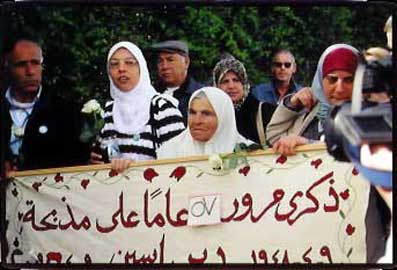
Deir Yassin Commemoration 2005 (1)
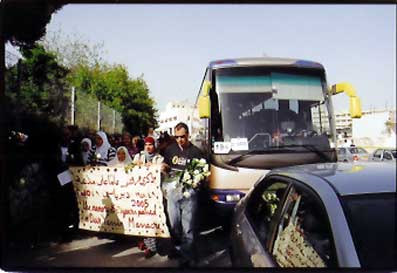
Deir Yassin Commemoration 2005 (4)
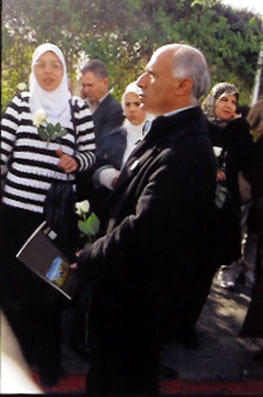
Deir Yassin Commemoration 2005 (6)
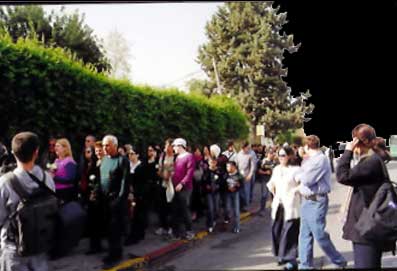
Deir Yassin Commemoration 2005 (5)
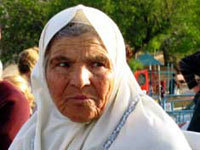
Deir Yassin Commemoration 2005 (19)
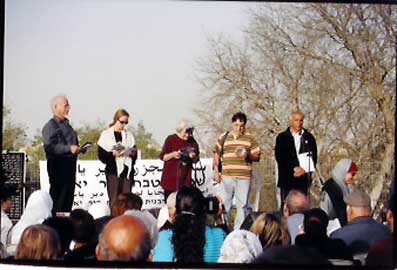
Deir Yassin Commemoration 2005 (16)

Deir Yassin Commemoration 2005 (7)
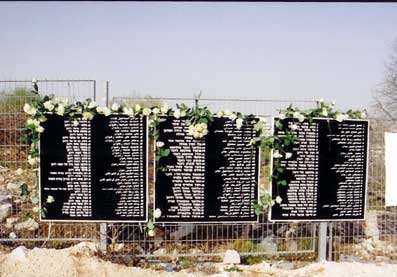
Deir Yassin Commemoration 2005 (14)
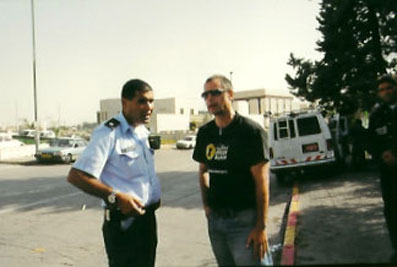
Deir Yassin Commemoration 2005 (2)



